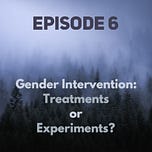Quick Notes
A whistle-stop tour through the history of psychological and medical approaches to sex and gender in the 20th century. This episode gives background and context to the formation of WPATH (World Professional Association for Transgender Health) and today’s “affirmative model of care” for gender issues.
Extended Notes
A little bit of history about gender transitions over the decades.
The medical and psychological theories behind gender transition have always been controversial.
Why would someone struggle with their gender?
Which gender roles should you raise your children in? Sasha shares a case that happened with twin boys, and one transitioned into a girl in 1965.
The outcome was not great. People played God on a child.
In 1965, only 3% of surgeons took sex change requests seriously. However, by the 70s, these surgeries were commonplace.
People pushed for experimental interventions too soon without having long-term data.
Instead of saying “should we do this?” doctors said, “can we do this?”
No one knows why a trans person exists. A psychologist would be asking questions to figure out this key piece.
It wasn’t until the 2010s that you’d see a huge uptick in gender dysphoria.
Both Stella and Sasha break down why they like Dr. Zucker and the research he’s conducted on child gender issues.
There are so many variables. It’s hard to know or pinpoint what makes a child want to transition.
Objectively, it may be better to have people come to terms with their biology vs. going through a very risky medical path.
There is a heavy medical burden when you try to transition. It is not an easy thing to do. Even certain trans people admit that, if you can avoid it, you would be better.
Sasha shares a gender study that used hormone blockers on children for two years and the reports they found.
What is the psychological impact of puberty blockers?
The criteria to see if you have gender dysphoria in the DSM, 5 out of 8 of them use outdated and stereotypical gender roles. Like if the boy or girl likes playing with the opposite sex toys.
There is such a thing as a placebo effect.
Sasha shares another study where 4.5% of males ended up dying from the gender intervention.
What’s crazy is a lot of these studies are deemed to be successful. Someone dying is not a success. It’s a tragedy.
From a medical and psychological perspective, there is a big difference between how you treat gay or lesbian people vs. how you treat a trans person.
The treatment for a trans person is to take drugs till the day you die. The treatment for being gay is to live your life.
How young is too young to get a child to transition?
How do you talk to young people about their gender? It can be quite troubling the different doctors’ approaches on the matter.
There doesn’t seem to be any studies showcasing why intervening early is going to be good for the long term wellbeing of a gender dysphoric child.
You’re halting the development of a young person, we should take that seriously.
Feeling distressed about your body? There might be something else going on and it might not just be strictly gender, to begin with.
Links
About John Money & David Reimer
Books
Harry Benjamin: The Transsexual Phenomenon, Human Outreach & Achievement Institute, (1966)
Robert Stoller: Sex and Gender: On the Development of Masculinity and Femininity, Science House, (1968)
Juno Dawson: The Gender Games, p.5, Hachette (2017)
Diane Ehrensaft: Gender Creative Child, The: Pathways for Nurturing and Supporting Children Who Live Outside Gender Boxes (2016)
Donald Winnicott: "Ego Distortion in Terms of True and false self ', in The Maturational Process and the Facilitating Environment (London 1965) p. 121
Criteria for Gender Dysphoria in the DSM 5:
https://www.psychiatry.org/patients-families/gender-dysphoria/what-is-gender-dysphoria
Standards of Care
WPATH Standards of Care (Version 7), 2012: https://www.wpath.org/publications/soc
Harry Benjamin Standards of Care (Version 6), 2001: http://www.genderpsychology.org/transsexual/hbsoc_2001.html
Media
Louis Theroux documentary: Transgender Kids: https://vimeo.com/264094716
Norman Spack Ted talk: https://www.ted.com/talks/norman_spack_how_i_help_transgender_teens_become_who_they_want_to_be
Studies
Zucker, K.; Bradley, S. (1995). Gender Identity Disorder and Psychosexual Problems in Children and Adolescents. Canadian Journal of Psychiatry. 35. Guilford Press. pp. 477–86.
Zucker, K., Wood, H., Singh, D. & Bradley, S. (2012) A Developmental, Biopsychosocial Model for the Treatment of Children with Gender Identity Disorder, Journal of Homosexuality, 59:3, 369-397, DOI: 10.1080/00918369.2012.653309
Zucker, K. (2016). Persistence and desistence in children and adults with gender variance: a comparative-developmental perspective. J Am Acad Child Adolesc Psychiatry, 55(10):S80
The Dutch studies
de Vries AL, Steensma TD, Doreleijers TA, Cohen-Kettenis PT. (2011). Puberty suppression in adolescents with gender identity disorder: a prospective follow-up study. J Sex Med. 8(8):2276-83.
de Vries, A.L. & Cohen-Kettenis, P. (2012): Clinical Management of Gender Dysphoria in Children and Adolescents: The Dutch Approach, Journal of Homosexuality, 59:3, 301-320
Wagenaar, T., Doreleijers, A., Cohen-Kettenis, P., de Vries, A., McGuire, J., Steensma, T., Eva C.F. (2014). Young Adult Psychological Outcome After Puberty Suppression and Gender Reassignment. Pediatrics; 134;696
de Vries A.L (2020) Challenges in Timing Puberty Suppression for Gender-Nonconforming Adolescents. Pediatrics. 2020;146(4):e2020010611
This podcast is partially sponsored by ReIME, Rethink Identity Medicine Ethics:
Learn more about our show: Linktr.ee/WiderLensPod











